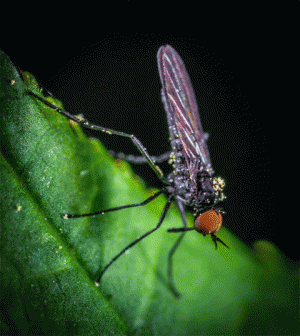- Finding Unshakable Power in a World That Wants to Pull Us ApartPosted 5 months ago
- What could a Donald Trump presidency mean for abortion rights?Posted 5 months ago
- Financial Empowerment: The Game-Changer for Women in Relationships and BeyondPosted 6 months ago
- Mental Health and Wellbeing Tips During and After PregnancyPosted 6 months ago
- Fall Renewal: Step outside your Comfort Zone & Experience Vibrant ChangePosted 6 months ago
- Women Entrepreneurs Need Support SystemsPosted 7 months ago
Say No To Mosquitoes, Naturally

By Deborah Mitchell | Naturallysavvy.com
Sometimes scary, dangerous things come in tiny packages, and the Zika virus fits that description. Ever since the Pan American Health Organization announced the first confirmed case of Zika viral infection in Brazil in May 2015, the mosquito-borne disease has been spreading quickly throughout South and Central America.
According to the Centers for Disease Control and Prevention (CDC), “Zika virus will continue to spread and it will be difficult to determine how the virus will spread over time.”
That uncertainty is a great reason to take precautions. Although the symptoms of Zika virus (fever, rash, conjunctivitis, joint pain) are typically mild and disappear within a week, the infection can be especially worrisome for pregnant women of any trimester and women who are trying to get pregnant.
These women run the risk of giving birth to children with significant birth defects, including microcephaly, a condition in which a child has an abnormally small head and an underdeveloped brain, which are typically accompanied by serious health problems that can be life-threatening.
Read about how to prepare for bug season
Although experts do not yet fully understand the relationship between the Zika virus and pregnancy outcomes, they are encouraging pregnant women, in particular, to postpone traveling to areas where the virus is known to be active.
As of January 26, 2016, the CDC issued a travel alert for Barbados, Brazil, Cape Verde, Colombia, Dominican Republic, El Salvador, French Guiana, Guadeloupe, Guatemala, Haiti, Honduras, Martinique, Mexico, Panama, Paraguay, St. Martin, Suriname, US Virgin Islands, Venezuela, and the Commonwealth of Puerto Rico. Although the virus has not yet been diagnosed naturally in the United States (versus being brought in by a traveler to an affected area), local transmission is possible.
The mosquitoes that carry Zika virus (Aedes aegypti and Aedes albopictus) also can transmit dengue fever, chikungunya, and yellow fever. Therefore everyone, but especially pregnant women, should take steps to avoid mosquito bites, and to do so as naturally as possible to avoid exposure to toxic substances (e.g., DEET, a neurotoxin) that can be found in many commercial mosquito repellents. Therefore, here are some natural ways to avoid mosquito bites.
Read about the West Nile Virus and mosquitoes
- Since the mosquitoes that spread Zika virus bite mostly during daylight hours, it’s especially important to wear protection during that time.
- Lemon eucalyptus oil is an effective, natural mosquito repellent that has the approval of the CDC. A recent study comparing 40% DEET and 32% lemon eucalyptus oil found that the DEET formulation provided 100% protection against mosquitoes for 7 hours and the lemon eucalyptus oil offered greater than 95% protection for 3 hours, and without the risk of neurotoxin exposure. Some products that contain 30% or higher of lemon eucalyptus oil report up to 6 hours of protection.
- You can easily make your own lemon eucalyptus oil mosquito repellent by mixing together one part lemon eucalyptus oil to 10 parts sunflower oil, vodka, or witch hazel. Place in a spritzer bottle and use as needed.
- Other essential oils, such as cinnamon and lemongrass, also can be helpful in deterring mosquitoes. Mix as you would the lemon eucalyptus formulation.
- Some success has been seen when using catnip oil (Nepeta cataria L.) against A. aegypti mosquitoes. Mix one part catnip oil with 10 parts sunflower oil, vodka, or witch hazel and use in a spritzer bottle.
- Combine 1 tablespoon of vanilla extract in 8 ounces of water in a spritzer bottle. Apply every 60 minutes or as needed.
- Since mosquitoes are weak flyers, sitting or standing near a blowing fan will keep them away
- If you don’t mind emitting the aroma of garlic, you could eat several cloves of fresh garlic per day. Your skin and sweat may keep mosquitoes (and perhaps your family and friends!) at bay.
- Wear long pants and long-sleeved shirts whenever possible.
- Use mosquito netting or screens in outside gazebos.
- At home, keep pots of rose-scented geraniums (Pelargonium x asperum; aka P. graveolens) on your patio and close to your doors. These flowers contain two oils, citronellal and geraniol, shown to repel mosquitoes.
- Remove all sources of standing water from around your home. Mosquitoes can breed in as little as one tablespoon of water.
Editor’s Note: We love the high-quality Lemon Eucalyptus Oil from our sponsor Now Foods, and vanilla extract from our sponsor Nature’s Flavors.






